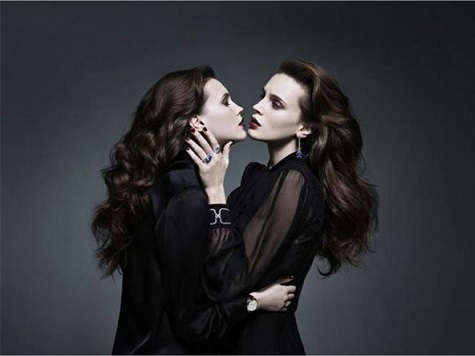
An advert for the high-end jewellers Chaumet has had an advert taken off public display in France. According to the Local the advert,which appears to show the moments before a lesbian kiss, has been is based on the Greek myth of Narcissus and depicts Marine Vacth about to kiss herself.
Responding to pressure for the local populace in Pecq, a small town in Yvelines department of Ile-de-France, the town council banned the advert. The 17,000 residents will no-longer see it on bus stops in the town.
Local Mayor Laurence Bernard told Le Parisien she had received “many calls from parents” about the advertising campaign.
“They told us that it bothered them that their children were subjected to this image, that it shocked and annoyed them to respond to their children’s comments on the subject.”
Gay rights groups in the area have criticised the decision to take the posters down. SOS Homophobia called the move by Pecq “an unacceptable practice of censorship.” Whilst The LGBT centre in Ile-de-France said: “we are not going to eradicate our existence, our daily lives, under the pretext that it would frighten some parents.”
Whilst an official statement by the Town Hall stated it was “not appropriate to leave these images up” as it was a risk to public order, the Mayor was conciliatory. She said: “I understand their anger and I’m sorry. I am appalled and sorry for the controversy that this raises. I wanted to make things calmer.
“I thought that by removing them, I made a step towards these residents and that I could get them to accept the evolution of society without rushing them.
“I think that those who asked for it to be taken down didn’t even realize that it was an interpretation of the myth of Narcissus.”
The advert is typical of the way high end jewellery and fragrances are marketed throughout the world. However, many of the more explicit examples are limited to magazines.
In this example the posters are openly displayed in public places throughout France. The controversy around it is also likely to see seen as a positive thing, because many advertisers like the notoriety a ban gives the product in question.

COMMENTS
Please let us know if you're having issues with commenting.